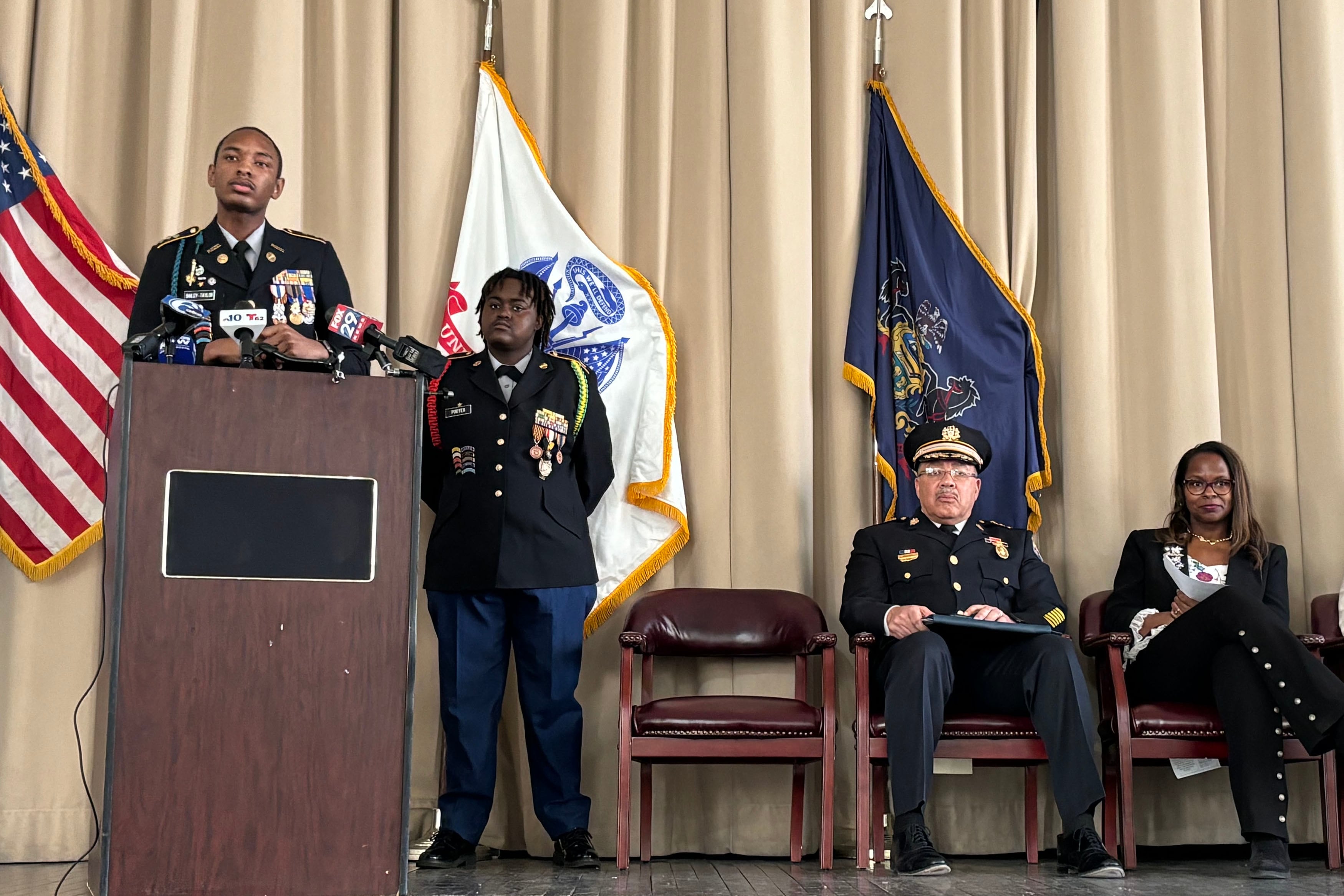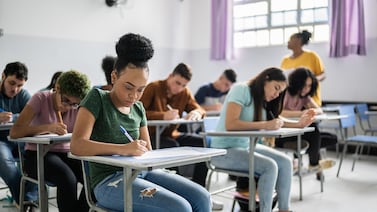Sign up for Chalkbeat Philadelphia’s free newsletter to keep up with the city’s public school system.
One day earlier this school year, a fifth grader came to school and was acting a little off. His motivation was down, his attention elsewhere, and his behavior unsettling.
It turned out he was traumatized because he had seen his father murdered the day before, said Brandy Blasko in the district’s office of school safety.
Unfortunately, this kind of scenario is not that uncommon in Philadelphia schools. In response, the city school district and police department have unveiled a $1 million program to help students deal with such trauma.
The program, announced by officials at a Monday press conference at the Philadelphia Military Academy, is called Handle With Care. It will train 300 police officers and 100 educators to sharpen their awareness of students’ exposure to violence and help them cope with trauma. It will be piloted in 15 schools starting next school year that are in the 22nd Police District, which covers parts of North Philadelphia.
While the program has been long in the works, it’s taken on new urgency in the wake of two shootings involving students leaving schools earlier this month in which one was killed and another 10 injured.
Handle With Care is a child-protection program first piloted in West Virginia and now used there statewide, as well as in Pennsylvania’s Lehigh Valley and elsewhere. The program starts with police who respond to a call and arrive at the scene of a traumatic event, from the execution of a search warrant to violence or sudden death. If a child is present at the scene, the police collect the child’s name and where they go to school, then notify the relevant school officials.
This system allows teachers and others to offer support, postpone tests or other academic work, and refer the child to nurses or counselors, among other responses. The program will also provide training to police and school personnel about the impact of trauma on children and how to respond to it in school, and officials will follow up with families.
Police Commissioner Kevin Bethel, who used to be the school district’s police chief, said it had been “a dream of mine for a long time” to bring such a program like Handle With Care to Philadelphia.
He noted that violence can impact schoolchildren even if they are not directly involved. In 2021 in the 22nd district’s 4.3 square miles, 300 people were shot and 70 killed.
“We’re starting here, in one of our most challenged communities,” Bethel said, adding that he eventually wants to use the program in the entire city.
But Bethel also said that children are exposed to all kinds of trauma-inducing events, from witnessing car accidents to being in a household with domestic violence. Such circumstances, if not addressed, can lead to discipline problems, dropping out, and criminal activity, he said.
“When we do something different, we can change that trajectory,” he said.
Children who have witnessed violence “have to sit in class carrying this burden on their shoulders,” said Jayme Banks, the school district’s deputy chief of prevention, trauma and intervention.
“Their level of stress interferes with their ability to succeed, to form positive relationships, to make friends,” Banks said.
Bethel said the communication between police and school officials would be year-round, even when school is not in session.
At Monday’s press conference, two students from the Philadelphia Military Academy attested to the need for the program.
Nadia Porter, who is the school’s command sergeant major, said that the programs will be “very useful” because “a lot of kids are not seen as trauma victims, but as problem starters.”
Kaheem Bailey-Taylor, the brigade commander who mentioned the two recent shootings in which one student died and 11 were injured, received an honor from his ROTC program for going to the aid of a student who had been shot at a birthday party.
“This program will bring some hope to the youth,” he said.
Referring to the student who witnessed his father’s death, Blasko said that at first, “No one knew why he was acting that way,” she said. “Now they will.”
The grant funding for Handle With Care in Philadelphia is from the U.S. Department of Justice. The 15 schools that will participate in the Handle With Care pilot program are:
- Richard R. Wright.
- Robert Morris.
- Paul L. Dunbar.
- James G. Blaine.
- William Dick.
- Ethel Allen.
- Tanner G. Duckrey.
- Edward Gideon.
- William D. Kelley.
- General George G. Meade
- High School of Engineering and Science.
- Philadelphia Military Academy
- Vaux Big Picture High School.
- Murrell Dobbins Career & Technical High School.
- Strawberry Mansion High School.
Dale Mezzacappa is a senior writer for Chalkbeat Philadelphia, where she covers K-12 schools and early childhood education in Philadelphia. Contact Dale at dmezzacappa@chalkbeat.org.







